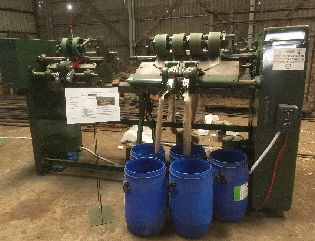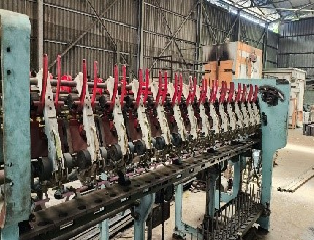ICAR-National Institute of Natural Fibre Engineering and Technology (ICAR-NINFET), Kolkata, has successfully developed an innovative mini-spinning machinery set to support small enterprises in processing jute and allied fibres. ICAR-NINFET, Kolkata has executed the herculean task of scaling down of huge machinery of capacity from 10,000 kg per day to 100-300 kg per day with the technical support of Industrial Partner, M/s. Bhowmick Calculators, Kolkata, and financial support of National Jute Board, Ministry of Textiles, Govt. of India.
This advanced machinery set comprises a mini-carding machine, a hybrid mini-drawing machine with two drawing heads, and a mini-spinning machine with a capacity of 30 spindles. Compared to traditional commercial machines, which typically operate with 110 spindles, the mini-spinning machine offers a significantly downsized alternative both in scale and investment. The mini-carding machine is nearly half the size of its commercial counterpart, making the setup not only space-efficient but also cost-effective.

The project was executed with technical collaboration from M/s. Bhowmick Calculators, Kolkata, and financial support from the National Jute Board, under the Ministry of Textiles, Government of India. Through this initiative, ICAR-NINFET has successfully scaled down industrial machinery originally designed for processing up to 10,000 kg of yarn per day to a compact system suitable for micro-enterprises, all while reducing the setup cost from ₹5 crores to ₹35 lakhs.
The mini-spinning machinery was formally inaugurated on January 3, 2025, by the Union Minister of Textile, Shri Giriraj Singh. During the event, Dr. S.N. Jha, Deputy Director General (Agricultural Engineering), ICAR, reviewed the machinery’s performance and extended his heartfelt appreciation to the scientific and technical teams of ICAR-NINFET for accomplishing what he described as an extraordinary feat.

A fully operational jute fibre processing plant utilizing this machinery will be established at the Ram Krishna Mission premises in Saragachi, Murshidabad, West Bengal, by May 2025. The Mission will work in coordination with local jute farmers and artisans to produce yarn for handicrafts and jute bag manufacturing, contributing significantly to local economic development.
The mini jute processing plant is expected to generate employment opportunities for over 10,000 women artisans and farmers, empowering rural communities and boosting the jute-based cottage industry. This initiative represents a major step forward in making jute processing sustainable, inclusive, and accessible, in alignment with the broader goals of rural development and self-reliant India.
(Source: ICAR-National Institute of Natural Fibre Engineering and Technology, Kolkata)







फेसबुक पर लाइक करें
यूट्यूब पर सदस्यता लें
X पर फॉलो करना X
इंस्टाग्राम पर लाइक करें